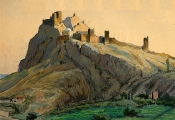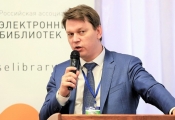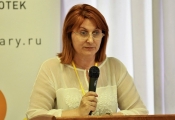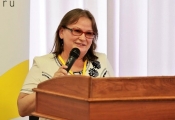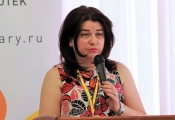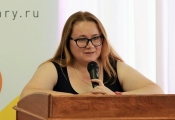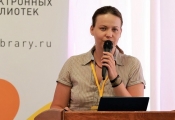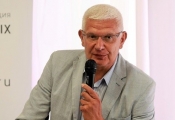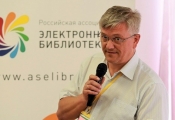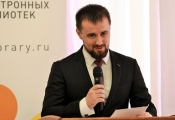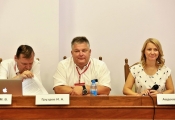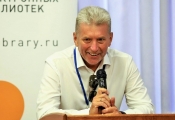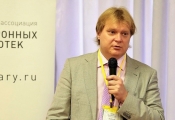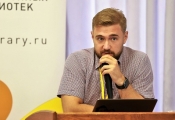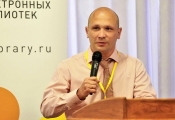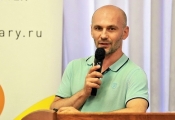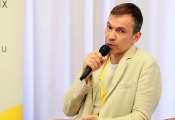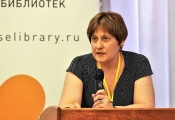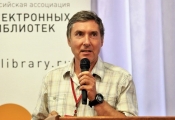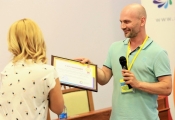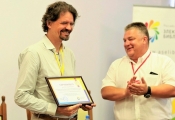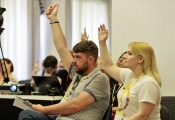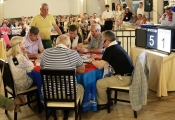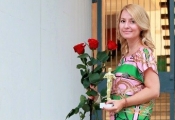The Fourth International Professional Forum “Book. Culture. Education. Innovations” (“Crimea 2018”)
09.07.2018
16 – 24 June 2018 the city of Sudak (Crimea) hosted the Fourth International Professional Forum “Book. Culture. Education. Innovations” (“Crimea 2018”). Its main organizer was Russian National Public Library for Science and Technology (RNPLS&T).
Among the co-organizers there were the following organizations:
• Ministry of Culture of the Russian Federation;
• Ministry of Education and Science of the Russian Federation;
• Federal Agency of Printing and Mass Communications;
• Non – governmental Ecological V.I.Vernadsky Foundation;
• International Association of Users and Developers of Digital Libraries and New Information Technologies;
• Ministry of Culture of the Republic of Crimea;
• National Library Association Libraries of the Future (NABB);
• Russian State Library (RSL);
• National Library of Russia (NLR);
• M.I.Rudomino All Russia State Library for Foreign Literature;
• Moscow State Institute of Culture.
Still there were inter-regional and local co-organizers such as:
• Crimean Republican Universal Scientific Library named after I. Franko (Simferopol);
• Republican I.Gasprinsky Crimean-Tatar Library;
• Tourist Health Complex “Sudak” (ТОК “Sudak”), the city of Sudak.
Within the framework of the forum there were held the following events: 25th Jubilee International Conference “Libraries and Information Resources in the Modern World of Science, Culture, Education and Business”, the Fourth Museum Assembly “To preserve traditions, to implement innovations”, educational symposium “Higher Education and Research Institutions within the Common Information Space”. Then, there took place the 3rd Branch Conference “Book Publishing and Libraries – Vectors of Cooperation”, 3rd general conference of the National Library Association "Libraries of the Future" and the International Conference on Global Ecological Problems (to the 155th Anniversary of Vladimir I. Vernadsky).
Among the participants of the forum there were representatives of the Ministry of Culture of the Russian Federation and of the Ministry of Science and Higher Education of the Russian Federation, together with the specialists of largest libraries and leading IT companies, there were also present teachers and lecturers of higher education institutions, representatives of publishing and book-selling organizations, people of science, culture and education, etc.
The opening ceremony of the conference was marked with the greeting speech by Yakov L. Shraiberg, chair of the Organizing Committee of the “Crimea” forum and the director general of the RNPLS&T. The speaker emphasized the significance of the preparatory work carried out by the staff of the libraries for organizing the event. Then Mr Shraiberg wished everyone lots of luck and success.
18 June, within the framework of the plenary meeting there was conducted a specialized event of the two Russian national libraries (the RSL and the NLR) devoted to the National Library Day.
The chairs of the event were Alexander I. Visly, the director general of the National Library of Russia; Eugenia N. Guseva, council of the direction board of the RSL; Nina V. Avdeeva, head of the Administrative department of management and monitoring service for clients of the RSL (UFKS RSL).
The first speaker to greet the audience was Vadim V. Vankov, councilor of the Minister of Culture of the Russian Federation. He described the reforms the ministry had undergone and announced the creation of the Department of Information and Digital Development which would include the Library Department.
The meeting raised the following aspects related to national libraries and their activities: their input into the development of the country and of the society; educational, international and enlightening activities of the national libraries; preservation of cultural heritage; participation of libraries in the creation of a common Russian electronic space of knowledge and many, many others.
Alexander I. Visly (NLR) who opened the working part of the meeting gave details on the changes which had taken place at Russian national libraries within the 25 previous years. Due to the Internet there dissolved queues and libraries became more available for wide masses of people. Still one of the key aspects in work of those establishments there remained settling disputable matters with right owners. Obligations of national libraries were not distinctly regulated by either of the existing documents, while a lot of tasks were performed by libraries in serving their users. The efficiency of electronic book delivery was much higher than that one for printed books, and that had been proved by mere calculations. Thus a lot of questions (that including the necessity of financing) would often be provoked by subscription of national libraries to externally-held content, for a part of those resources could be kept by other libraries in the printed form. Those problems which appeared when satisfying the informational readers’, libraries’, right owners’ and publishers’ demands would remain unsolved again and again. For the moment of speaking there was being prepared the legal basis for the system of payments to right owners.
|
М.D. Rodionov’s speech |
Speech “About the Russian Common Electronic Space of Knowledge” was presented by Mikhail D. Rodionov, director in NDL development (RSL). The launched project of the Russian Common Electronic Space of Knowledge (rus. Edinoe Rossiyskoe Elektronnoe Prostranstvo Znaniy, EREPZ) was one of the most significant aims the Government had pointed to accomplish for Russian scientific and library communities as well as for the software developing companies. Creation of the National Digital Library (NDL) was necessary for building up the society of knowledge with a large part of employees of the information sphere to be formed within it. The NDL as it was had to be updated in pursuit of the newly-formed conditions and tasks. Mr Rodionov told about the experience from abroad where the common information space had been built up by way of mutual agreements. The EREPZ project could cover not only libraries, archives and museums, but also “Kultura.rf” (Culture.ru) and “Istoriya.rf” (History.ru), as well as a lot of non-governmental resources containing priceless cultural heritage. As a result, the EREPZ formation process included three groups of aspects – organizational ones, technological and legal. And all of them needed additional detailed consideration and work.
Diana V. Ivanova, head of the Administrative department of securing usage of intellectual property rights (RSL) spoke on “Applying experience of the RSL for developing, entering and using licence agreements in the work of the Russian libraries and in contributing to the benefit of the national cultural policy”. When entering a licence agreement, right owners delegated rights for usage of their works by a certain way and within the framework of certain conditions set by the agreement itself (free as a rule). And libraries would often misuse those agreements by way of turning them into rights donation. The matter to be understood was that the norms of donation contracts could not be applied to licence agreements. Ms Ivanova explained thoroughly all the difference between exclusive and non-exclusive licencees and gave the examples from the current legislative norms. The speaker saw the solution of the problem in developing typical forms of licence agreements by libraries.
Tatyana D. Maksimiuk, manager of information resources of the Department of prospective digital resources (NLR), presented her speech “Way of a digital copy – from the experience of the Digital Library of the NLR”. The Concept of the NLR Development being ratified, the library started digitizing its collections. The entries to be digitized first were manuscripts, maps and other valuable documents. The digitized materials were spread along the 26 thematic collections. The Digital Library of the National Library of Russia would constantly be replenished and developed, and that was organized on the basis of usage of the latest technologies.
Irina I. Naumova, head of the Department of collections and services (NLR) spoke on “Transforming library service for users of the NLR in the new organization and technological conditions”. The National Library of Russia was being located at several buildings, and in order to hand literature to readers at each of them there were necessary certain conditions to be satisfied. Implementation of the latest information technologies had enabled the library improve the quality of user service significantly. The advantages of electronic book delivery were praised by both, the staff and the readers of the NLR. The taken measures had contributed to minimization of losses in the additional fund. Readers could obtain everything they needed in one and the same reading room, and the time of order delivery was shortened. The attendance rates grew. The active usage of feedback forms helped the librarians solve working problems in time and improve the quality of service. The new building being gained made the total area of the library several times wider. The collections which used to be stored in inappropriate conditions were moved to the new building premises.
Ekaterina B. Dudareva, head of the Education Centre (RSL), presented her speech “Educational activity of the Federal State Financed Institution the Russian State Library – traditions, innovations and prospects”. For the moment of speaking the library and information sphere witnessed the practice of staff certification to be restarted. The certifying committees evaluated professional level of librarians, and in that connection the possibility to acquire additional professional qualification turned especially important. The main directions of work of the Education Centre of the RSL for the moment of speaking were organization of educational process, implementation of new forms of education (that including distance learning), scientific and education and methodological support, project educational activity, organization of student practice and participation in cultural and enlightening events. There were practiced short-termed modules and individual approach to each of the trainees. And in plans there were opening Corporate University “Leninka” (rus. KUL) which would train professionals not only for the RSL, but for all the libraries of the nation.
|
М.S. Lenshina’s speech |
Maria S. Lenshina, head of the Department of electronic communications (NLR), spoke on “National Library in media environment – frames and capabilities”. Ms Lenshina described the peculiarities of communication in the media environment and the related demands towards librarians’ work. Usage of such social networks as “V Kontakte” (rus. “Вконтакте”) and “Facebook” enabled users communicate with each other all over the world in Russian, and that communication indicated high interest towards Russian culture. Certain elements of websites (hashtags, for example), were translated into English. Media environment opened opportunities for placing exhibitions, organizing lectures, getting attendance statistics and statistics of users’ feedback, and a lot of other opportunities, too.
|
N.М. Nekrasova’s speech
|
Nadezhda M. Nekrasova, 1st category editor of the Department of website editing (RSL), presented her speech ”Virtual exhibition as a new form of presenting library collections”. Virtual exhibitions helped to make information search more efficient and they would reveal to users not only texts, but also graphics, audio and video materials. Ms Nekrasova gave examples of well–organized virtual exhibitions and of those ones which were mere failure. She also spoke on the experience of the RSL in that sphere. In 2018 the Russian State Library started to implement new technologies for representing books in a new way and for raising their availability level for a wider audience. For example, readers acquired capability to leaf digitized editions themselves. Exhibitions demonstrated collections of the RSL and contained links to the Digital Library of the RSL. There was also offered the capability of automated adaptation to mobile devices and integration with other services.
|
S.М. Kudriashov’s speech
|
Sergey M. Kudriashov, head of the Department of foreign library study and international library affairs (RSL), offered the audience his speech “Certain aspects of international activities of the RSL”. Mr Kudriashov spoke on the participation of the RSL in the activities of the International Federation of Library Associations (IFLA). Within the framework of those activities, the RSL cooperated with international organizations, national libraries of several states and with representatives of social and cultural and educational establishments. The RSL acquired the status of the Russian-speaking centre of IFLA and it helped to promote representatives of Russia and the CIS states to IFLA committees. Unfortunately, the RSL specialists worked in only 19 sections of IFLA. Along with foreign organizations, the RSL participated in projects targeted at digitalization and preservation of unique documents, and at making them available for readers, too.
|
А.А. Soshnin’s speech
|
Alexander A. Soshnin, head of the Administrative department of securing collection preservation (RSL), spoke on ”Experience of organizing a complex approach to activities providing preservation of library collections with the example of the Department of restoration of the RSL”. The history of work of the RSL in preserving its collections had counted several decades, still there emerged the necessity of developing a complex approach to that problem. Apart from the very process of restoration there had to be considered properties of materials, and that was the reason the library invited chemists, biologists, physicists and technologists to cooperation. There was started a school of scientific restoration of quality. The activities of the school parallel to restoration aimed at prevention measures and steps, that including creation of conditions for efficient preservation of documents. Preventive conservation was the aspect of particular attention in that connection. Implementation of new technologies helped to slow down the process of ageing of paper documents and to minimize possible damages. Since the year of 2015 the Administrative department of securing collection preservation had been managing all those matters at the RSL, and it could boast of exclusively highly qualified professionals to be employed.
|
B.G. Khlistunov’s speech
|
Bogdan G. Khlistunov, deputy head of the Federal Centre of Conservation of Library Collections (NLR), presented his speech “Main streams of activities of FTKBF NLR” (in co-authorship with Teimur O. Sultanov, head of the Federal Centre of Conservation of Library Collections (rus. Federalniy Tsentr Konservatsii Bibliotechnykh Fondov, FTKBF), NLR). Document restoration was basing on the two main principles: of an adequate necessity and of the differentiated approach. The technologies applied were both, classical and modern ones. The restoration process was carried out in cooperation with preservers. Mr Khlistunov gave details concerning methods and devices for document restoration then. In order to supervise the storage conditions there was carried out monitoring of a range of parametres. Theory and practice of collection conservation and restoration was being developed and put down in research works by the specialists of the FTKBF NLR. As the problem of increase of volume of damaged and old documents was common for numerous libraries, the development of technologies of collection restoration and conservation thus was turning to be of a significant demand.
Traditionally the “Crimea” forum included international conference “Libraries and Information Resources in the Modern World of Science, Culture, Education and Business”. That year the conference was held for the twenty-fifth time and bore the jubilee status. Within the framework of the conference there took place section “Digital Libraries and Online Resources in the Modern Library and Information Environment” which had been organized with the support of the RSL. That section was a special event devoted to the National Library Day for the two Russian national libraries, the Russian State Library and the National Library of Russia.
The section was conducted by the following speakers: Igor A. Gruzdev, IT director (RSL), Mikhail V. Goncharov, head of the Group of prospective research and analytical prognosis (RNPLS&T), and Nina V. Avdeeva, head of the Administrative department of management and monitoring service for clients (RSL). The meeting of the section which took place 19 June, 2018, witnessed 11 reports of its participants.
|
А.I. Visly’s speech
|
Alexander I. Visly (NLR) spoke on “National Digital Library: Is Mars close or far?”. Upon the speaker’s view, all the activities of the National Digital Library had to be regulated by a special document which was “Regulation on the activities of the National Digital Library” (rus. “ Polozhenie o deyatelnosti Natsionalnoy elektronnoy biblioteki”). Still the aforementioned regulation had not been ratified. The NDL had to accept 100% legal deposit copies of printed editions in the electronic form, and right owners had to be paid for their works in accordance with the statistics data of their usage. Access to the electronic copies of editions had to be provided to libraries accepting legal deposit copies according to Federal Law №77-FZ “About legal deposit copies” dated by 29.12.1994. Another important aspect to be considered was the huge number of right owners, and each of them had to be negotiated with about the ways their work could be used. While publishers and developers of Digital Library Systems were convenient partners to agree with. All the mentioned above circumstances influenced the fact that the NDL could not attain the desirable level of functioning. Probably the legislation had to be amended. The statistics of addressing directly the NDL documents through its portal counted only 20% of all the addresses, while the majority of users addressed to them through the websites of libraries and other retrieval systems.
|
О.N. Shorin’s speech
|
Oleg N. Shorin, IT director (NLR), presented his speech “Not only by bibliography records (3 sketches for brains)…”. The agreement about exchanging bibliography records on the free basis had been achieved by the Russian State Library and the National Library of Russia, after that the analogic agreements were performed by other organizations. As a result a lot of establishments turned to use the same bibliography records, and there appeared the necessity of an optimal service to operate with them. In order to promote library electronic resources among the readers of the NLR, there were edited information leaflets, and the number of access sessions to digital resources was increased by 62%. Libraries had to advertise their resources and to raise the interest of a wide circle of readers to them. Such companies could be organized in cooperation with publishers. The majority of libraries were using free software for statistics collection. In the nearest future there was planned a specialized programme product libraries would integrate into their websites to collect statistics of access of their electronic resources. That programme product would enable publishers to receive information on the books readers were particularly interested in, thus publishers would be able to sell those very books. Publishers would determine themselves which kind of access to which document they were ready to provide.
Andrey V. Zaytsev, deputy chief technologist (the Presidential Library), spoke on “New capabilities of access to the digital collections of the Presidential Library – updating Internet portal in the years of 2017/2018”. The modernized Internet portal of the library was based on a completely new platform where there was implemented a modern system of informational communication with users. Mr Zaytsev described in details the access capabilities of the collections of the Presidential Library, as well as stages of the development of the portal. For the portal there had been used technologies the analogues to which did not exist. Tools for work with the collections were modernized as well: representation of collections became more demonstrative. There were developed centres of remote access, there were carried out Internet broadcasts of events, there was set integration with external resources and there was updated interface of user’s personal account. The library was trying to support equal access conditions to its collections for all categories of users.
|
А.А. Yerpuliov’s speech
|
Anton A. Yerpuliov, head of the Department of organization and management of the collections of the RSL Digital Library, spoke on “System of acceptance of electronic legal deposits at the Russian State Library”. Mr Yerpuliov gave details on the stages of work with the software, beginning with request for Personal Account of Document Producer transition, through its verification by the operator of the system and up to downloading document into the system by document producer through their personal account. An aspect of the speaker’s particular attention became using qualification electronic signature. Then Anton Andreevich paused at the stages of the computer check the downloaded file had to go through (for integrity, document format, presence of text layer, chromaticity and quality of picture resolution), and at the ‘hand’ check by the RSL specialists. The most important moments of work at user’s personal account being described, the speaker shared the main statistics data on the system functioning and provided information concerning interesting editions which had entered the RSL collections not long before that.
|
Е.G. Malysheva’s speech
|
Ekaterina G. Malysheva, chief specialist of the Department of support of access to digital resources (RSL), presented her speech “Developing and supporting digital resources of the Russian State Library” (in co-authorship with Nina V. Avdeeva, head of the Administrative department of management and monitoring service for clients, RSL). The Russian State Library would continue supporting century-long traditions in serving readers, and it would implement modern technologies as well. Still the aspects which remained unchanged were orientation towards clients and their interests and raising service quality as the tasks of primary importance. Ms Malysheva described the wide circle of services available to the readers of the RSL that including the collections of the RSL Digital Library, their component parts, conditions of access to the documents and tools for work with them. The report would also highlight the conditions of access to remote network resources.
Alexander B. Indenbom, head of the Department of information system development (NLR), spoke on “Electronic archives of local legal acts on the basis of system of electronic document circulation”. Since the year of 2014, at the National Library of Russia there had been used module “Kantseliariya” (“Chancery”) of system of electronic document circulation “Directum”. On its basis there would be started the digital archives of orders and decrees. The development of the electronic archives of local legal acts could be considered a quality transition from the traditional system of document circulation to the system of digital content management. Still certain questions remained unsolved. Which format was to be used for document preservation? Where to keep documents? How to secure document intelligibility? What had to be done with the electronic signature? How to organize access to the archives? Legal basis for electronic documents needed actualization. And the prospects for usage of the archives were long-term document preservation and primary accounting documents to be included.
Vladimir M. Liutetsky, science director (LLC “Raduga-LIK”) offered his speech “Bibliopoisk as a discovery system for libraries, schools and higher education institutions – services free and paid for”. In order to make Russia obtain the first positions in science and education development there had to exist an adequate scientific search – the system available for all the Russian libraries. The ”Bibliopoisk” discovery system was covering library catalogues, digital library resources and resources of Digital Library Systems, open sources and the unlimited number of library websites. Mr Liutetsky complained about the problems of cataloguing of external sources, for the high frequency of updating moments of digital libraries and databases prevented them from being included into the system, and a lot of websites on the Internet were not supporting bibliographical standards. Meanwhile the discovery system could search for a document irrespectively of its language, it would count for diverse mechanisms of field indexation and many other peculiarities which would not be found with an ordinary search engine. “Bibliopoisk” could be characterized by settings not only for relevance, but for pertinence (readiness to meet users’ expectations) as well. The speaker offered all the libraries to put the common search box of the “Bibliopoisk” on their websites free-of-charge in order to carry out search across free sources.
Igor A. Gruzdev (RSL) presented his speech “Digital library of the RSL”. Development of the electronic resources of the RSL was realized by several stages. At first documents had been digitized, new technological devices appeared, then the Digital Dissertation Library of the RSL started its work, with the specialized software developed and new electronic collections included. Then there came the system of access control and the system of work in user’s personal account. For the moment of speaking the Digital Library of the RSL could boast of high rates of book delivery. Still there remained certain difficulties in RSL cooperation within the National Digital Library project. The complicated structure of the National Digital Library made it hard to change anything in its software and in the software used at the RSL. There could be seen a certain disorganization generated by the great number of participants of the project. Improvements in management of the NDL structure were needed badly. Increase in the collections of the RSL induced new plans for digitization. And updating parametres of the search system were required as well. There were carried out negotiations with editors about possibility of re-addressing of search queries to their websites where final users would be able to buy the book they were looking for.
Valery Y. Kornev, head of the Department of NDL management (RSL), spoke on “National Digital Library as a library for libraries” (prepared in co-authorship with Ruslan V. Bobrik, head of the National Digital Library Administrative department, RSL). There were described main stages of development of the NDL, from its first version of the NDL portal of 2015 (NDL 1.0), through the version of 2016 when obligatory user authorization was canceled (NDL 2.0), the one of 2017 with the transition to the national search software (NDL 3.0) to the version of 2018 when the National Digital Library had to integrate with external resources (NDL 4.0). For the moment of speaking there was functioning version NDL 4.0, and users were welcome to search for documents, make up selections and read them of course if the document was in open access. In case the access was restricted, readers could look through the document they needed only inside one of the libraries participant of the NDL project. 7,500 digital reading rooms were registered as NDL reading rooms all over Russia, and users’ activism was growing more and more with time. The NDL collections comprised 4.25 million objects. References to the NDL sources were included into the search results by ordinary browsers and they occupied the first positions among others. The NDL collections offered their users music score archives which were in a great demand.
Elena B. Gruznova, head of the Department of cooperation with NDL (NLR), presented her speech “Participation in the NDL project as reflected by the mirror of its statistics”. When working with the National Digital Library, ordinary statistics tools turned to bring incorrect results. Thus the developers of the NDL preferred the tools of their own. Ms Gruznova shared the main statistics data of accesses to the NDL resources. Diverse approaches to data collection brought differences to final results, and a certain part of the information would turn to be left aside. The speaker described in details the problems of usage of the statistics tools, with all of their advantages and drawbacks. There were also offered ways of solutions for the aforementioned problems. And the ideal final result was viewed as equal access conditions for all the users of the NDL resource.
Kirill A. Kolosov, head researcher (RNPLS&T), spoke on “Electronic resources and collections of the RNPLS&T – dynamics of development, statistics of usage and technologies” (prepared in co-authorship with M.V. Goncharov, RNPLS&T). The search engine of the RNPLS&T offered its users a large tool set. The technological basis for placing the digital resources of its own the RNPLS&T had chosen was digital archives. And platform “InfoRost” had been supporting access to its digital library since the year of 2017. All the collections of the digital library were constantly replenished. Mr Kolosov described in details which sources of the digital archives were the most popular ones in different years. To conclude the speaker pointed out at the necessity of a more accurate statistics tool set to carry out the analysis of the users’ demands and of access frequency.
The ceremonial part of the meeting of Section 1 was marked with handing certificates denominating the fact of the research conducted by the experts of the Russian Association of Digital Libraries (NPP “ELBI”). Nina V. Avdeeva and Igor A. Gruzdev handed the certificates to the representatives of the following organizations:
|
V.M.Liutetsky with
the certificate
(LLC ”Raduga-LIK s Vami”)
|
K.N.Kostiuk with the
certificate
(LLC “Direct-Media”)
|
- LLC “Raduga-Lik s Vami” (research over integrated search system “BIBLIOPOISK”);
- LLC “Direct-Меdia” (research over digital library “Biblioteka NON-FICTION”).
Apart from the plenary meeting and eight sections, the forum included a lot of other events – seminars, roundtable discussions, conferences and speeches devoted to the Library Innovations Day, Day of the Crimean Libraries and other significant dates. There were also organized specialized events of the National Electronic Information Consortium, of the public accessible libraries of St. Petersburg, of the IRBIS School, etc. There was held night press rendezvous “Topical and inconvenient questions requiring fair answers from librarians, politicians, authors, publishers and specialists of education and museum spheres”.
For the participants of the forum there had been prepared a rich cultural programme. There was held quiz show “What? Where? And when? in library and information, book and publishing milieu”, intellectual and discussion duel “To the Barrier!”, video film contest “All about libraries, inside libraries and for libraries”, exhibition “Library systems, information and publishing productions”, as well as excursion tours, musical plays and creative party of the poet and Russian people’s artist Alexander Pankratov-Chiorny. The guests of the forum had a chance to participate in the competitions in tennis, ping-pong, billiards and chess.
At the closing ceremony of the Fourth International Professional Forum “Book. Culture. Education. Innovations” the Russian State Library was awarded the certificate for organization of the special event of the Russian national libraries and a diploma of a co-organizer of the “Crimea 2018” forum. Head of the RSL UFKS Nina V. Avdeeva was handed the highest award of the conference as “Best event chair”.
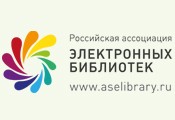 |
With the support of the Russian Association of Digital Libraries there were organized Internet broadcasts of the following events which could be viewed by any user:
- National Library Day (within the framework of the plenary meeting) http://www.aselibrary.ru/video/conference43/conference438362/;
- Section 1 “Digital Libraries and Online Resources in the Modern Library and Information Environment” within the framework of 25th Jubilee International Conference “Libraries and Information Resources in the Modern World of Science, Culture, Education and Business” http://www.aselibrary.ru/video/conference43/conference438365/.
Besides, the Russian Association of Digital Libraries had contributed to realizing video-shooting of the following forum events:
- roundtable “International Cooperation of Russian Libraries 2018”;
- special seminar “Librarian’s Personal Brand and its Impact on Positioning Library in the Age of Changes”;
- special focus seminar “Economics of Knowledge and its Infrastructure”;
- section “Library Innovation Development and Quality Management”;
- special event “Libraries – Stories of Success”;
- special event of strategic planning “Libraries – the mission is determinable, or How we are going to implement May Regulations of 2018”.
You are welcome to view our videos on the official website of the Russian Association of Digital Libraries http://www.aselibrary.ru/ in section “Videos of the events”.
General agenda of the Fourth International Professional Forum “Book. Culture. Education. Innovations” (“Crimea 2018”) is available on the official website of the RNPLS&T http://www.gpntb.ru/win/inter-events/crimea2018/prog.pdf.


 Virtual Keyboard
Virtual Keyboard
 по-русски
по-русски

